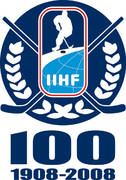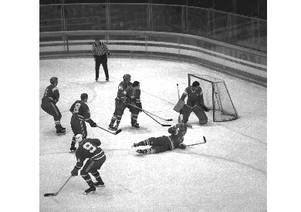

Story #81 Czechoslovakia snaps Soviets' six-year winning streakGRENOBLE, France; February 15, 1968
The game became a classic that no one who saw it will ever forget. Boris Mayorov gave the Soviets the lead after just 28 seconds, but the Czechoslovaks bounced back, scoring three unanswered goals in less then four minutes. For the rest of the evening the teams played arguably the best international game to date. The pace and emotion was spectacular as the Soviets found themselves in the unique position of having to play come-from-behind hockey.
The CSSR squad had a 4-2-lead going into the final period and when Jaroslav Jirik (who would one year later become the first player from inside the Iron Curtain to play in the NHL) scored the fifth goal with four minutes left, everyone in the Olympic arena thought the game was as much as over. But the Soviets had one more comeback in them. Viktor Polupanov and Mayorov scored within one minute to make it a 5-4 game as the defending champions staged a furious assault on goaltender Vladimir Dzurilla.
And, indeed, goaltending proved to be the difference. While Dzurilla was superb, the Soviets' Viktor Konovalenko had a poor game, having surrendered two weak goals. The Soviets could not manage to score the tying goal, and the Czechoslovaks celebrated as if they had ensured their first ever Olympic gold medal. They hadn't. An earlier 3-2-loss to Canada and a 2-2-tie against Sweden two days after the Soviet game sealed their fate. Anatoli Firsov and his comrades won their third Olympic gold after pounding Canada 5-0 on the final day.
Despite handing the Soviets their first loss in five years, the Czechoslovaks had to settle for the silver. However, the game on February 15, 1968, will never be forgotten. About the Top 100 StoriesAs part of the IIHF's 100th anniversary celebrations, www.IIHF.com is featuring the 100 top international hockey stories from the past century (1908-2008). Starting now and continuing through the 2008 IIHF World Championships in Canada, we will bring you approximately three stories a week counting down from Number 100 to Number 11.
The Final Top 10 Countdown will be one of the highlights of the IIHF's Centennial Gala Evening in Quebec City on May 17, the day prior to the Gold Medal Game of the 2008 World Championship.
These are the criteria for inclusion on this list: First, the story has to have had a considerable influence on international hockey. Second, it has to have had either a major immediate impact or a long-lasting significance on the game. Third, although it doesn't necessarily have to be about top players, the story does have to pertain to the highest level of play, notably Olympics, World Championships, and the like. The story can be about a single moment — a goal, a great save, a referee's call — or about an historic event of longer duration — a game, series, tournament, or rule change. |
 Click here for the 100 Top Stories
|
|







